Herbs for the Bees...And You!
When the bees start flying I can’t wait to get out there to dig in the hives and start planting in the soil. There’s a huge variety of herbs that are not just wonderful for cooking and medicinal purposes, they’re great for the bees. Planting herbs that attract honey bees is something that anyone can do.
You may not have a large plot of land for an herb garden but most people can tuck a few herbs in somewhere, even if they only have a postage stamp yard, balcony, hanging basket or doorstep. Container gardening is easy, and you still help your local bees!
If you are purchasing already grown herb plants instead of starting them from seed, please remember to purchase from an organic supplier. We get ours from a sustainable and organic co-op which is good for the bees and our collective planet. Many big box stores sell plants that have been cultivated with the use of insecticides which are toxic for bees. So while you are trying to do something nice for the bees you may actually be doing harm.
Here is a short list of herbs which the bees love and so will you!
Borage – This powerhouse herb produces a lot of nectar, it’s easy to plant from seed, blooms well into the fall, will self-seed once you get it going and it’s readily available. Historically, it’s been planted to increase honey production. Bees know that this flower refills with nectar quickly. It’s great as a companion plant alongside tomatoes and cabbages because it helps to ward away harmful insects and worms. It’s also believed to improve the health of the plants that grow around it. The flowers and leaves are not only beautiful but they’re a welcome addition to any salad.
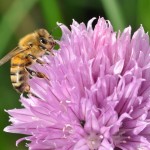 Chives – These wonderful plants flower early in almost all regions, conditions and climates so when the weather is warm enough for your bees to fly, the chives are already producing nectar for them. They are also perennials so they will produce for many years to come. If you haven’t had chive infused butter, you have been missing out!
Chives – These wonderful plants flower early in almost all regions, conditions and climates so when the weather is warm enough for your bees to fly, the chives are already producing nectar for them. They are also perennials so they will produce for many years to come. If you haven’t had chive infused butter, you have been missing out!
Comfrey – an amazing herb which will enrich your soil from deep below the surface. It leaches high levels of potassium and nitrogen into your soil. Both of these elements are key nutrients and will ensure you have a healthy garden. Its leaves are high in allantoin, a substance that causes cells to multiply, making it a great addition to your herbal medicine cabinet to treat burns, wounds, bug bites and even bee stings! It’s great topically but is toxic to humans when consumed so don’t eat it! But best of all, the bees LOVE it!
Lemon Balm (Melissa) – Lemon Balm is known by many names, Melissa, the genus name means “honeybee” and it is definitely a favorite of the bees. It’s also a wonderful herb to have on hand. The leaves are antibacterial, anti-inflammatory, antioxidant, antiviral, sedative and aromatic. It’s used to treat many conditions. Internally it’s good for insomnia, migraine, hyperactivity, Flu, and anxiety. When used topically it can help with cold sores and shingles. In short, it’s pretty much good for all that ails you and it tastes beautiful!
Rosemary
Rosemary – a perennial which likes sun and well-drained soil, this plant will be a wonderful addition to every garden. It also lends itself to being grown in a pot . It’s a culinary herb which attracts bees from far and wide. You can also use rosemary infused in apple cider vinegar as a rinse for your hair to help with dandruff and itchy scalp.
And of course, don’t forget to let your dandelions, plantain, and clover grow, they are some of the first sources of nectar for the bees. While you’re at it, remember that many plants which are considered weeds are beneficial to honeybees. So let the multiflora rose, wild asters and goldenrod bloom before you hack them down. The bees will thank you.


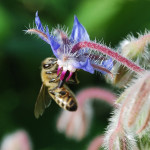
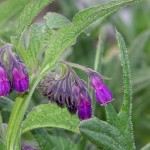
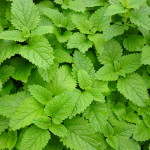
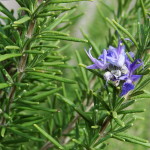


Comments
Post a Comment
We love hearing from you!
Express yourself clearly and use sources when possible.